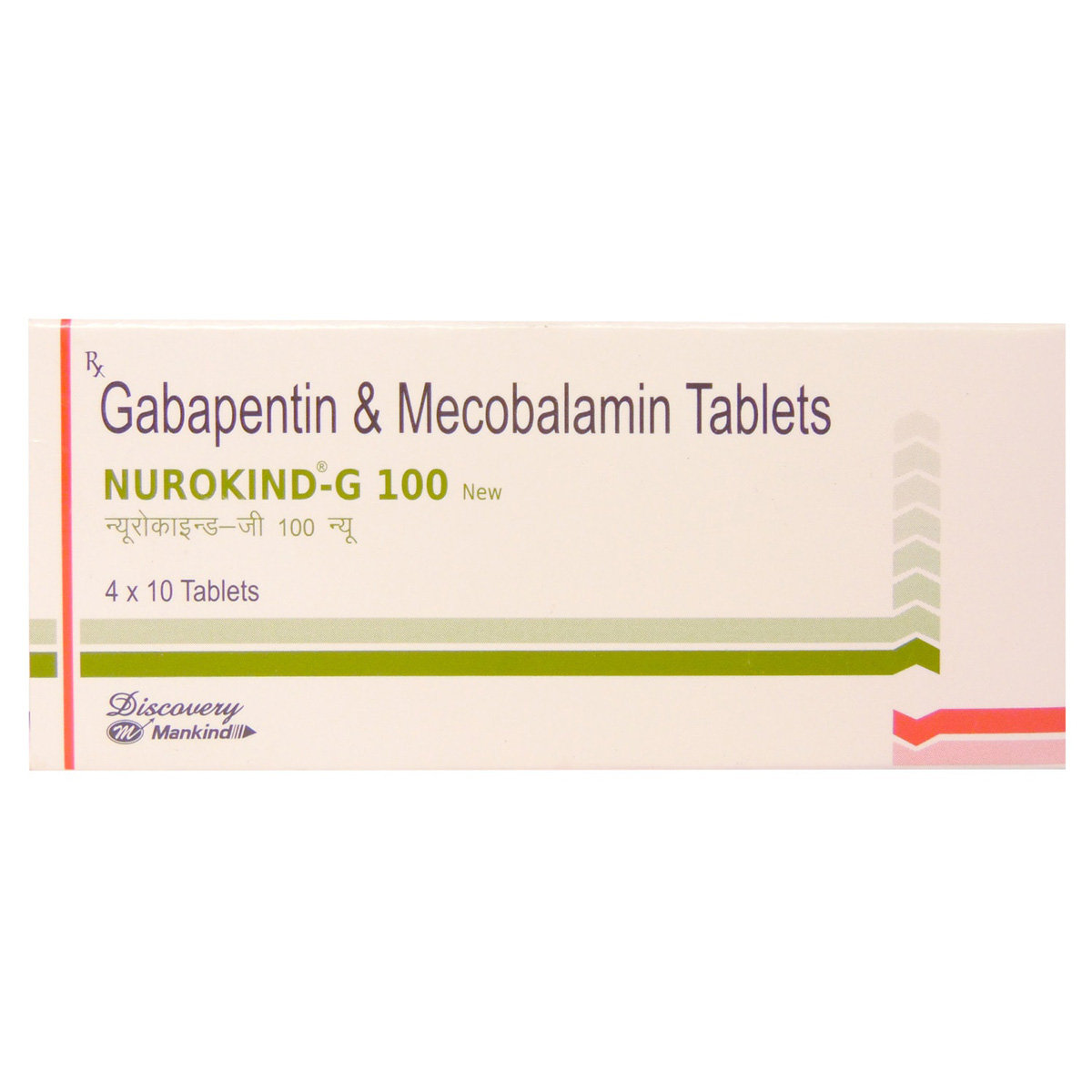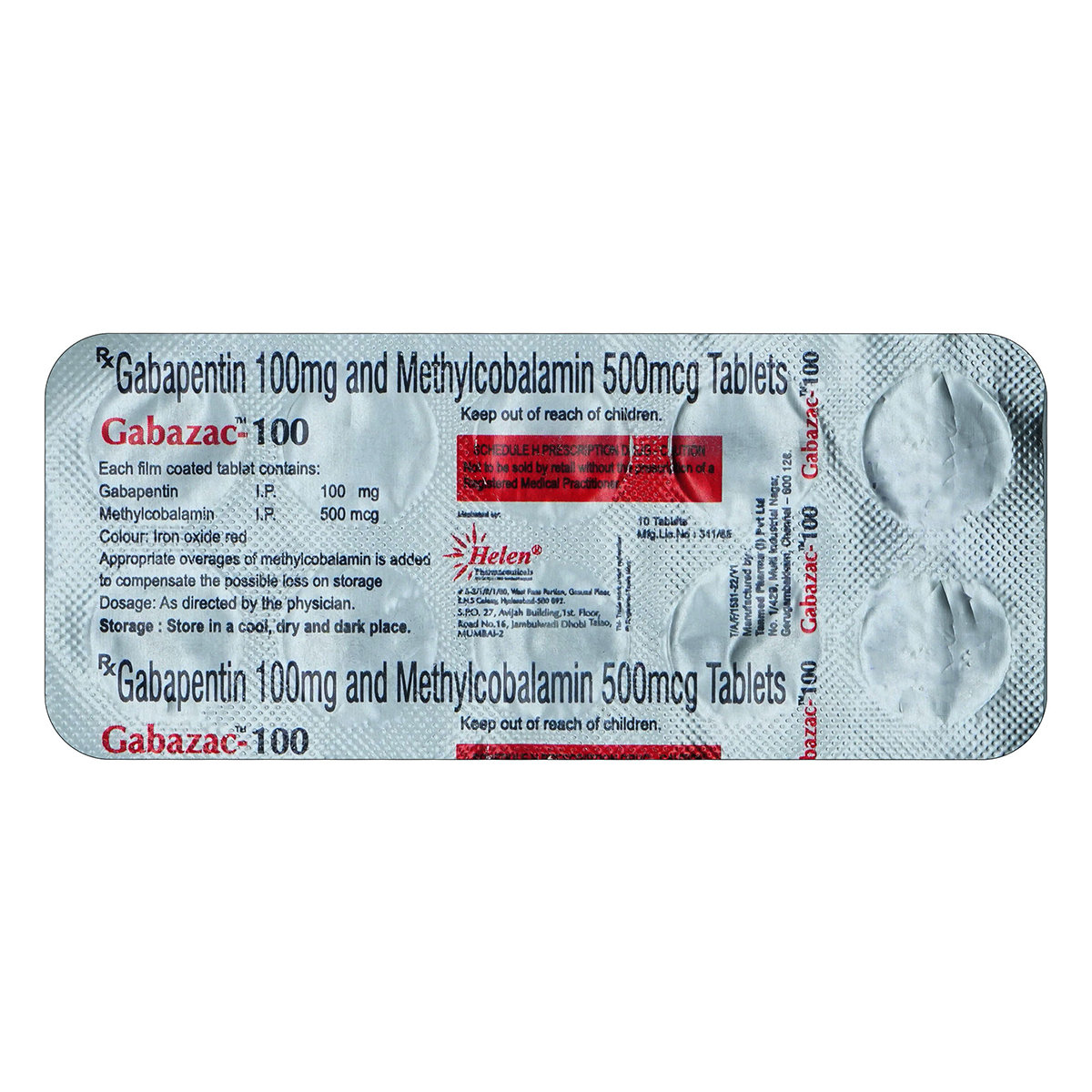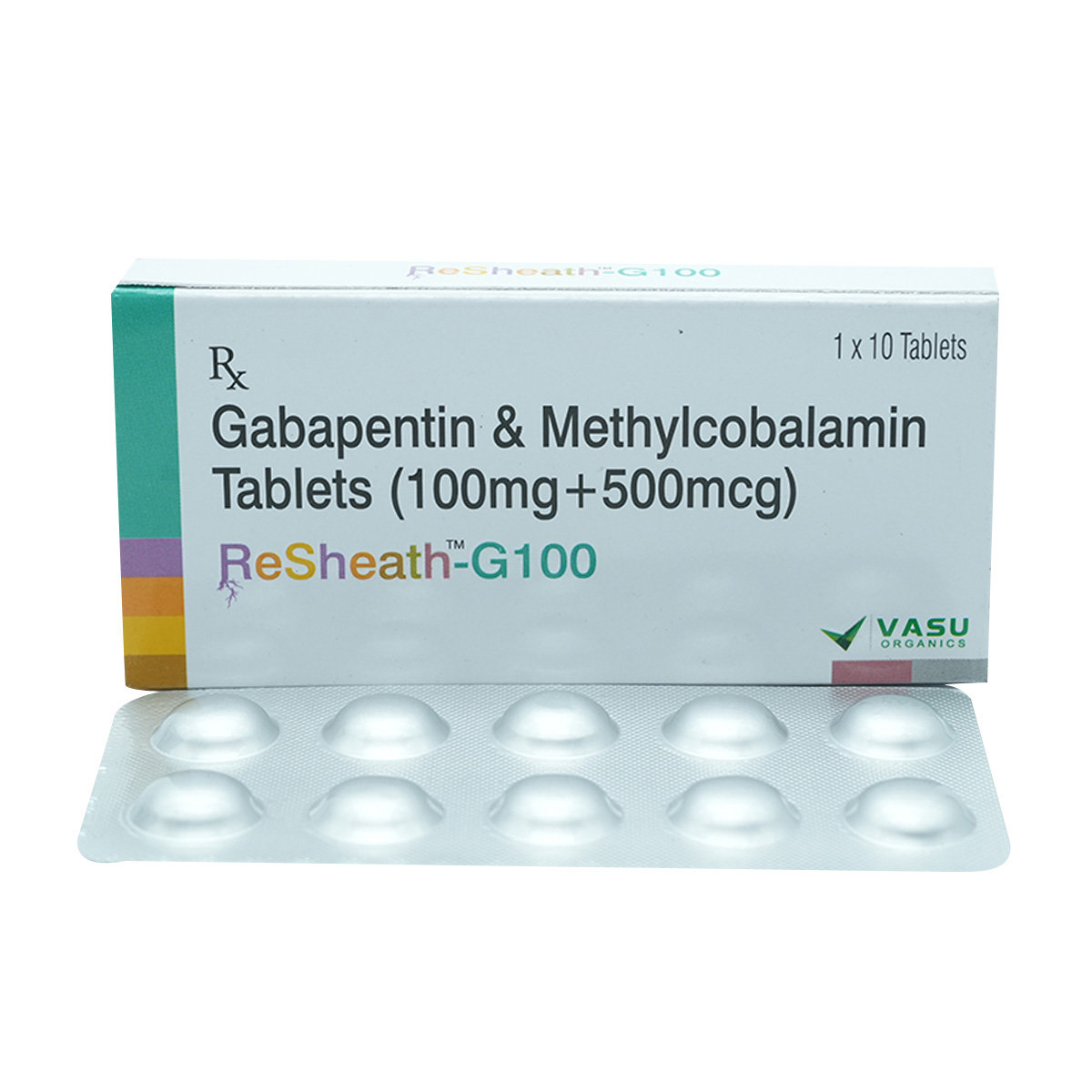Freenerve-G Tablet 10's
MRP ₹175
(Inclusive of all Taxes)
₹26.3 Cashback (15%)
Provide Delivery Location
Online payment accepted
 Prescription drug
Prescription drugWhats That
Composition :
Manufacturer/Marketer :
Consume Type :
Return Policy :
About Freenerve-G Tablet 10's
Freenerve-G Tablet 10's belongs to a group of medicines called 'anticonvulsants' used to treat partial seizures (epilepsy) and various conditions of nerve pain/damage like post-herpetic neuralgia and restless leg syndrome in adults and children above 3 years of age. Epilepsy is a neurological condition in which the brain's activity becomes abnormal with seizure episodes, sometimes losing awareness or consciousness. Neuralgia is a chronic pain condition of the nerves that occurs due to nerve damage or other neurological conditions like neuropathy, trigeminal neuralgia or shingles.
Freenerve-G Tablet 10's is a combination of two medicines: Gabapentin (anti-convulsant), Mecobalamin (vitamin B12). Gabapentin treats seizures by balancing a chemical messenger in the brain called a neurotransmitter, thereby decreasing its abnormal excitement in the brain. Mecobalamin is a Vitamin B12 that helps rejuvenate and protect damaged nerve cells by producing a substance called myelin. Together, Freenerve-G Tablet 10's helps provide relief from neuropathic pain caused due to nerve damage and other neurological disorders.
Take Freenerve-G Tablet 10's as prescribed by your doctor. You are advised to take Freenerve-G Tablet 10's for as long as your doctor has prescribed it for you depending on your medical conditions. You may experience dizziness, tiredness, sleepiness and uncoordinated body movements. Most of these side effects of Freenerve-G Tablet 10's do not require medical attention and gradually resolve over time. However, if the side effects are persistent, reach out to your doctor.
To treat your condition effectually, continue taking Freenerve-G Tablet 10's for as long as your doctor has prescribed. Please do not stop taking Freenerve-G Tablet 10's without consulting your doctor as it could cause withdrawal symptoms. Keep your doctor informed about your health condition and medicines to rule out any side-effects. Freenerve-G Tablet 10's causes drowsiness and dizziness, so drive only if you are alert. Freenerve-G Tablet 10's should not be given to children as safety and effectiveness have not been established. Avoid consuming alcohol along with Freenerve-G Tablet 10's as it could lead to increased dizziness and sleepiness. Do not take Freenerve-G Tablet 10's if you are pregnant or breastfeeding unless prescribed by the doctor.
Uses of Freenerve-G Tablet 10's
Directions for Use
Key Benefits
Freenerve-G Tablet 10's belongs to a group of medicines called 'anticonvulsants' used to treat partial seizures (epilepsy) and various conditions of nerve pain/damage like post-herpetic neuralgia and restless leg syndrome in adults and children above 3 years of age. Freenerve-G Tablet 10's is a combination of two medicines: Gabapentin (anti-convulsant), Mecobalamin (vitamin B12). Gabapentin treats seizures by balancing a chemical messenger in the brain called a neurotransmitter, thereby decreasing its abnormal excitement in the brain. Mecobalamin is a Vitamin B12 that helps rejuvenate and protect damaged nerve cells by producing a substance called myelin. Together, Freenerve-G Tablet 10's helps provide relief from neuropathic pain caused due to nerve damage and other neurological disorders.
Storage
- Inform your doctor about dizziness symptoms. They may adjust your medication regimen or prescribe additional medications to manage symptoms.
- Follow your doctor's instructions for taking medication, and take it at the same time every day to minimize dizziness.
- When standing up, do so slowly and carefully to avoid sudden dizziness.
- Avoid making sudden movements, such as turning or bending quickly, which can exacerbate dizziness.
- Drink plenty of water throughout the day to stay hydrated and help alleviate dizziness symptoms.
- If you're feeling dizzy, sit or lie down and rest until the dizziness passes.
- Track when dizziness occurs and any factors that may trigger it, and share this information with your doctor to help manage symptoms.
- Rest well; get enough sleep.
- Eat a balanced diet and drink enough water.
- Manage stress with yoga and meditation.
- Limit alcohol and caffeine.
- Physical activities like walking or jogging might help boost energy and make you feel less tired.
Drug Warnings
Do not take Freenerve-G Tablet 10's if you are allergic to any of its contents. Inform your doctor before taking Freenerve-G Tablet 10's if you have heart problems or bipolar syndrome, nervous system disorders or older than 65. Consult your doctor if you are on hemodialysis and experience muscle pain or weakness, persistent stomach pain, nausea or vomiting. Please do not stop taking Freenerve-G Tablet 10's without consulting your doctor as it could cause withdrawal symptoms. Freenerve-G Tablet 10's causes drowsiness and dizziness, so drive only if you are alert. Freenerve-G Tablet 10's should not be given to children as safety and effectiveness have not been established. Avoid consuming alcohol along with Freenerve-G Tablet 10's as it could lead to increased dizziness and sleepiness. Consult your doctor immediately if you experience suicidal tendencies. Freenerve-G Tablet 10's should not be given to children below three years as the safety and effectiveness have not been established. Do not take Freenerve-G Tablet 10's if you are pregnant or breastfeeding unless prescribed by the doctor.
Drug-Drug Interactions
Drug-Drug Interactions
Login/Sign Up
Combining Freenerve-G Tablet with Esketamine can increase the risk of side effects.
How to manage the interaction:
Although taking Freenerve-G Tablet and Esketamine together can evidently cause an interaction, it can be taken if a doctor has suggested it. Consult a doctor if you experience any symptoms such as drowsiness, confusion, difficulty concentrating, and impairment in thinking, judgment, reaction speed, and motor coordination. Do not stop using any medications without a doctor's advice.
Taking fentanyl with other drugs that cause central nervous system depression, such as Freenerve-G Tablet, might result in an increased risk of adverse effects.
How to manage the interaction:
Although combining Fentanyl and Freenerve-G Tablet may cause an interaction, they can be used if advised by your doctor. Consult your doctor immediately if you feel drowsiness, trouble breathing, dizziness, or confusion. If you have any of the above symptoms, it is advised not to drive or use any hazardous machinery. Do not stop taking any medication without consulting your doctor.
Combining Meperidine with Freenerve-G Tablet can increase the risk of CNS depression.
How to manage the interaction:
Co-administration of Pethidine with Freenerve-G Tablet can possibly result in an interaction, but it can be taken if a doctor has advised it. Do not stop using any medications without a doctor's advice.
Combining Remifentanil with Freenerve-G Tablet can increase the risk of side effects.
How to manage the interaction:
Taking Freenerve-G Tablet with Remifentanil together can possibly result in an interaction, but it can be taken if a doctor has advised it. If you notice any symptoms like trouble breathing, dizziness, or trouble focusing, make sure to contact a doctor right away. Do not discontinue any medications without consulting a doctor.
Co-administration of Buprenorphine and Freenerve-G Tablet may cause central nervous system depression and lead to serious side effects (respiratory distress -build-up of fluid in the air sacs of the lungs).
How to manage the interaction:
Although there is a possible interaction between Freenerve-G Tablet and Buprenorphine, you can take these medicines together if prescribed by a doctor. However, if you experience shortness of breath, fast heart rate, fast breathing, extreme tiredness, fever, cough with phlegm, or shallow breaths, consult the doctor immediately. Do not discontinue any medications without a doctor's advice.
Combining Sufentanil with Freenerve-G Tablet can increase the risk of CNS depression.
How to manage the interaction:
There may be a possibility of interaction between Freenerve-G Tablet and Sufentanil, but it can be taken if prescribed by a doctor. It's important to keep an eye on your health and talk to a doctor about any concerns. They can recommend different options that won't cause any problems. If you notice any symptoms like trouble breathing, feeling dizzy or tired, or having trouble focusing, make sure to call your doctor right away. Do not discontinue any medications without first consulting your doctor.
Co-administration of Methadone and Freenerve-G Tablet may cause central nervous system depression and lead to serious side effects such as respiratory distress (build-up of fluid in the air sacs of the lungs).
How to manage the interaction:
Although there is a possible interaction between Freenerve-G Tablet and Methadone, you can take these medicines together if prescribed by a doctor. However, if you experience shortness of breath, fast heart rate, fast breathing, extreme tiredness, fever, cough with phlegm, or shallow breaths, please consult your doctor immediately. Do not discontinue any medications without a doctor's advice.
Taking Freenerve-G Tablet with Sodium oxybate can increase the side effects on the central nervous system.
How to manage the interaction:
Although taking Freenerve-G Tablet and Sodium oxybate together can evidently cause an interaction, it can be taken if a doctor has suggested it. If you notice any of these signs - feeling tired, dizzy, lightheaded, confused, sad, having low blood pressure, or difficulty breathing - make sure to contact your doctor right away. Do not stop using any medications without talking to a doctor.
Co-administration of Butorphanol and Freenerve-G Tablet may cause central nervous system depression and lead to serious side effects such as respiratory distress (build-up of fluid in the air sacs of the lungs).
How to manage the interaction:
Although there is a possible interaction between Freenerve-G Tablet and Butorphanol, you can take these medicines together if prescribed by a doctor. However, if you experience shortness of breath, fast heart rate, fast breathing, extreme tiredness, fever, cough with phlegm, or shallow breaths, please consult a doctor immediately. Do not discontinue any medications without a doctor's advice.
When Hydrocodone is taken with Freenerve-G Tablet, the amount of Hydrocodone in the blood may be reduced.
How to manage the interaction:
Although there is a possible interaction between Freenerve-G Tablet and Hydrocodone, you can take these medicines together if prescribed by a doctor. If you notice any symptoms like trouble breathing, dizziness, or trouble focusing, make sure to contact a doctor right away. Do not stop using any medications without a doctor's advice.
Drug-Food Interactions
Drug-Food Interactions
Login/Sign Up
Diet & Lifestyle Advise
- Include food rich in vitamin B and D in your diet to improve nerve health and prevent nerve pain.
- Include cayenne pepper in your diet as it can help in lowering neuropathic pain.
- Exercising regularly helps in improving overall health and combating pain.
- Rest well, get plenty of sleep.
- Try taking a warm bath as it can be soothing. It helps in increasing blood circulation, thereby decreases numbness and pain.
- Avoid smoking and alcohol consumption.
- Meditation and yoga can help lower stress, decrease pain sensitivity and improves coping skills.
- Physical relaxation and massages can help provide symptomatic relief.
- Learn about techniques for sitting, stretching, moving and standing from a physical or occupational therapist. These can help prevent pain.
- Acupuncture can be helpful by stimulating pressure points.
- Using essential oils for massages can help increase circulation and boosts healing.
Side Effects of Freenerve-G Tablet 10's
- Dizziness
- Tiredness
- Sleepiness
- Uncoordinated body movement
Habit Forming
Therapeutic Class
All Substitutes & Brand Comparisons
RX
Gabapent M Tablet 10's
Lividus Pharmaceuticals Pvt Ltd
₹68
(₹6.13 per unit)
64% CHEAPERRX
Out of StockPeribrim G 100 Tablet 10's
Jagsam Pharma
₹75
(₹6.75 per unit)
61% CHEAPERRX
Nurokind-G 100 New Tablet 10's
Mankind Pharma Pvt Ltd
₹93.5
(₹8.42 per unit)
51% CHEAPER
Drug-Diseases Interactions
Drug-Diseases Interactions
Login/Sign Up
FAQs
Drug-Drug Interactions Checker List
- METFORMIN
- CHLORAMPHENICOL
- CIMETIDINE
- DEXLANSOPRAZOLE
- ESOMEPRAZOLE
- OMEPRAZOLE
- PANTOPRAZOLE
- RABEPRAZOLE
- RANITIDINE
- AMILORIDE
- CITALOPRAM
- DULOXETINE
- FLUOXETINE
- PREGABALIN
Special Advise
- Close monitoring for suicidal thoughts/behaviour is required for people using Freenerve-G Tablet 10's.
- Not for use in children less than 3 years of age.
- Using Freenerve-G Tablet 10's in children 3-12 years of age can cause emotional changes, aggressive behaviour, concentration problems, restlessness, school performance changes and hyperactivity.
Disease/Condition Glossary
Neuropathic pain: It is a nervous system disorder caused due to damage to sensory nerves. It is caused by chronic progressive nerve disease or due to infection or injury. The pain could be intermittent or continuous, which is felt as a prickling, stabbing, tingling or burning sensation. A feeling of numbness and loss of sensations is also common with neuropathic pain. Usually, the body sends the pain signals when there is an injury, but with neuropathic pain, the pain is not triggered by an injury, the body unpromptedly sends the pain signals. Symptoms include spontaneous, untriggered pain, unpleasant feeling, shooting, burning or stabbing pain, difficulty resting or sleeping and evoked pain (pain caused by events that are usually not painful).

Have a query?
Alcohol
Safe if prescribed
Avoid consumption of alcohol while taking Freenerve-G Tablet 10's as it may increase dizziness and sleepiness.
Pregnancy
Consult your doctor
Avoid taking Freenerve-G Tablet 10's if you are pregnant unless prescribed by a doctor. Please consult your doctor if you have any concerns regarding this, your doctor will prescribe only if the benefits outweigh the risks.
Breast Feeding
Consult your doctor
Consult your doctor before taking Freenerve-G Tablet 10's; your doctor will decide whether Freenerve-G Tablet 10's can be taken by breastfeeding mothers or not.
Driving
Safe if prescribed
Freenerve-G Tablet 10's causes drowsiness, sleepiness and tiredness. Do not drive or operate machinery unless you are alert.
Liver
Consult your doctor
Dose adjustment may be needed in patients with liver impairment. Please consult your doctor if you have a liver impairment or any concerns regarding this.
Kidney
Consult your doctor
Dose adjustment may be needed in patients with kidney impairment. Please consult your doctor if you have kidney impairment or any concerns regarding this.
Children
Safe if prescribed
Freenerve-G Tablet 10's should not be given to children less than 3 years of age. For the above 3 years of age, close monitoring is required.









